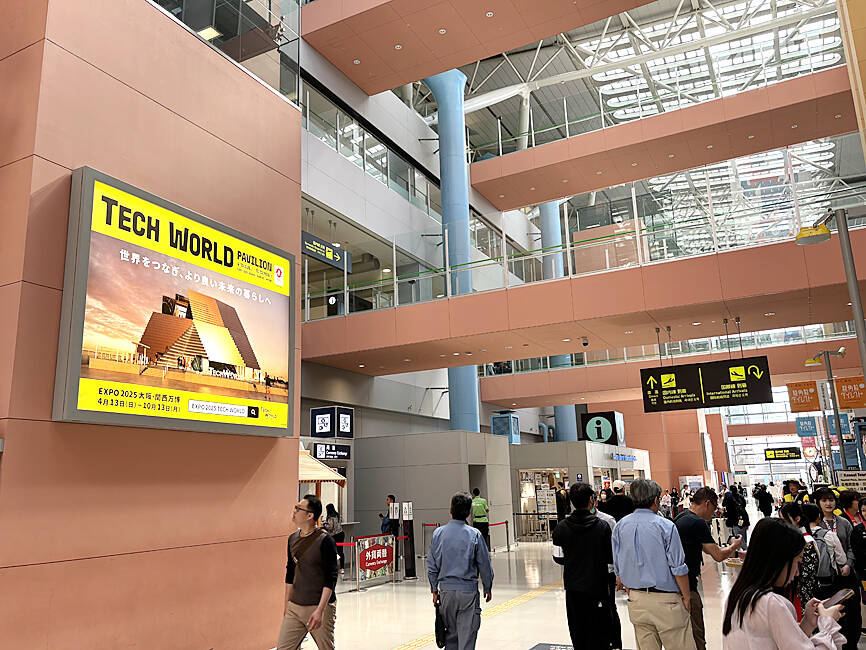Taiwan does not have an official pavilion at the World Expo in Osaka, Japan, because of its diplomatic predicament, but the government-backed Tech World pavilion is drawing interest with its unique recreations of works by Taiwanese artists.
The pavilion features an artificial intelligence (AI)-based art gallery showcasing works of famous Taiwanese artists from the Japanese colonial period using innovative technologies.
Among its main simulated displays are Eastern gouache paintings by Chen Chin (陳進), Lin Yu-shan (林玉山) and Kuo Hsueh-hu (郭雪湖), who were the three young Taiwanese painters selected for the East Asian Painting exhibition in 1927.

Photo: CNA
Gouache is a water-based opaque paint that offers brighter and heavier pigment coverage than watercolors, and the “Eastern gouache” technique has been defined as paintings that use colors mixed with gelatin, clay or metal.
One of the featured paintings, a 1968 work called Orchid (香蘭), was done by pioneering female artist Chen later in her life and portrays a woman in formal attire seated on a chair.
Another of the works, Lin’s 1930 classic masterpiece of Taiwanese Eastern gouache during the Japanese colonial period called Lotus Pond (蓮池), depicts a field of lotus flowers and an egret in the lower left.

Photo: CNA
Meanwhile, a display combining the 1930 work Festival on South Street (南街殷賑) by Kuo, which depicts a festive look at Taipei’s Dihua Street during the colonial period, with the modern Taipei 101 skyline, is the favorite of the head of the pavilion’s organizer.
James Huang (黃志芳), honorary chairman of Tamayama Digital Tech Co, said Kuo’s work, reinterpreted through technological innovation, is the one he most wanted to introduce to foreign visitors to the event.
The gallery also features recreations of works of other famous Taiwanese artists, including Huang Tu-shui (黃土水), Chen Cheng-po (陳澄波), Lee Shih-chiao (李石樵) and Li Mei-shu (李梅樹).
The government spent NT$2 billion (US$61.55 million) to build the Tech World pavilion, which is taking part in the World Expo as a private-sector pavilion.
Beyond the AI-based art gallery, it showcases a slew of smart technologies and products developed by Taiwanese companies such as Asustek Computer Inc, AUO Corp and Hiwin Technologies Corp, said the Taiwan External Trade Development Council, which James Huang also heads.
The pavilion has three multimedia theaters offering visitors an interactive and immersive experience through display technologies.
Takashi Kubota, a Japanese visitor to the Tech World pavilion, said he visited Taiwan 30 years ago when he took the Alishan Forest Railway train in Chiayi County, but Tech World had shown him scenic spots in Taiwan he had not seen.
He said the Taiwanese temple architecture images showcased in the AI Art Gallery were the most impressive displays he saw.
The World Expo opened on April 13 and runs until Oct. 13.

Several Chinese Nationalist Party (KMT) officials including Chairman Eric Chu (朱立倫) are to be summoned for questioning and then transferred to prosecutors for holding an illegal assembly in Taipei last night, the Taipei Police said today. Chu and two others hosted an illegal assembly and are to be requested to explain their actions, the Taipei City Police Department's Zhongzheng (中正) First Precinct said, referring to a protest held after Huang Lu Chin-ju (黃呂錦茹), KMT Taipei's chapter director, and several other KMT staffers were questioned for alleged signature forgery in recall petitions against Democratic Progressive Party (DPP) legislators. Taipei prosecutors had filed

Taiwan would welcome the return of Honduras as a diplomatic ally if its next president decides to make such a move, Minister of Foreign Affairs Lin Chia-lung (林佳龍) said yesterday. “Of course, we would welcome Honduras if they want to restore diplomatic ties with Taiwan after their elections,” Lin said at a meeting of the legislature’s Foreign Affairs and National Defense Committee, when asked to comment on statements made by two of the three Honduran presidential candidates during the presidential campaign in the Central American country. Taiwan is paying close attention to the region as a whole in the wake of a

NEW WORLD: Taiwan is pursuing innovative approaches to international relations through economics, trade and values-based diplomacy, the foreign minister said Taiwan would implement a “three-chain strategy” that promotes democratic values in response to US tariffs, Minister of Foreign Affairs Lin Chia-lung (林佳龍) said. Taiwan would aim to create a “global democratic value chain,” seek to capitalize on its position within the first island chain and promote a “non-red supply chain,” Lin was quoted as saying in the ministry’s written report to the Legislative Yuan submitted ahead of the legislature’s Foreign Affairs and National Defense Committee meeting slated for today. The Ministry would also uphold a spirit of mutual beneficial collaboration, maintaining close communication and consultations with Washington to show that Taiwan-US cooperation

Taiwan and the US have begun trade negotiations over tariffs imposed by US President Donald Trump earlier this month, Minister of Foreign Affairs Lin Chia-lung (林佳龍) said in an interview this morning before reporting to the Legislative Yuan’s Foreign Affairs and National Defense Committee. The Taipei Economic and Cultural Representative Office (TECRO), Taiwan’s de facto embassy in the US, has already established communication channels with the US Department of State and the US Trade Representative (USTR), and is engaging in intensive consultations, he said. Points of negotiation include tariffs, non-tariff trade barriers and issues related to investment, procurement and export controls, he